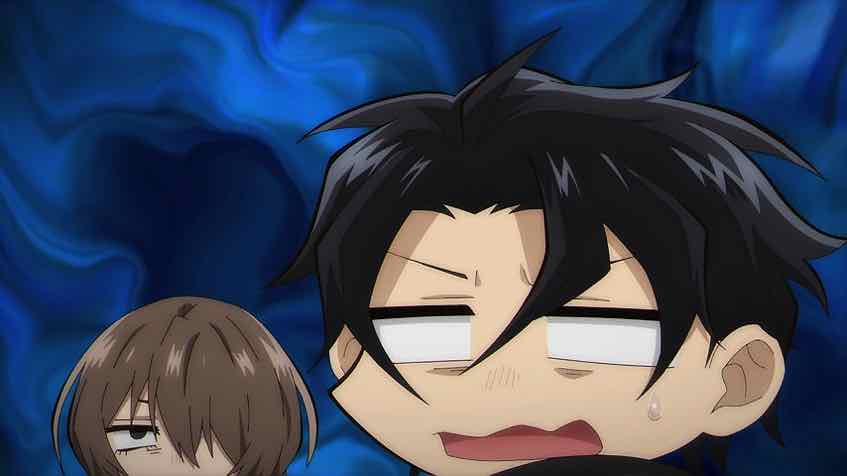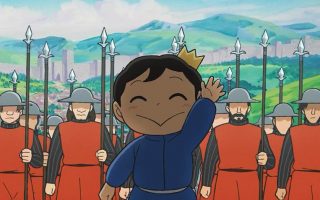So what do I call that episode? Even though I went with “End” the last time and was eventually proved wrong, it’s the only option here. History repeats in this sense – I have no clue whether there’ll be another season of Yofakushi no Uta. The anime’s story isn’t finished and no attempt was made to do so (despite Kotoyama reportedly writing this episode specifically for the anime). But the manga is finished and while quite popular, not a kaijuu or anything. If I were to slap odds on it I’d go maybe 55-45 in favor of the adaptation getting a conclusion, but that’s pure conjecture on my part.
Kotoyama writing this ep was a good thing to be sure, because it felt pretty contiguous with the continuity of the story and probably wouldn’t have in other hands. It was a pretty satisfying end to what’s generally been a disappointing season, without being anything spectacular. I think in the final analysis whether you think this season was a success (and many do, as it ranks higher than the first – or the manga – on English aggregator sites) depends on whether you think Anko’s story was worthy of being its main focus. I don’t, frankly. An arc? Sure. The whole season? Meh.
What’s interesting is that the series acknowledges what I consider the flaws of the story, which I assume to mean Kotoyama doesn’t consider them flaws. Anko’s plan being ridiculous? She says so herself. The whole affair amounting to a glorified suicide attempt? From the mouths of babes – Kou calls it out. Sawashiro Miyuki being as good an actor as she is certainly helps a great deal, and she’s fantastic in this final episode. But in the end I still don’t really get why I’m supposed to care so much about Anko that I’m happy to have her hijack the plot and make everything about her.
What’s good here is that at least in a roundabout way, we do get back to the core themes of the story a little. Anko is, unsurprisingly, feeling like shit given her utter lightweight status. Nazuna and Kou drag her back to Naz’ apartment (on his back), but she demands not to be left alone when they go out for water (tap water here isn’t that bad). So she forks over ¥30,000 for Nazuna’s cuddling service, which is more than enough to convince her to leave Kou in her hands. And some cuddling does happen here, though it’s more commiserating than anything (which is what cuddling is a lot of the time, I suppose).
Anko whines about how she’s wasted the last ten years of her life, and Kou can’t really refute such an obvious truth. He talks about being “normal”, and what that means – and reflects on his realization that adults aren’t any more normal than kids. And they’re all weird in different ways, just as kids are. That’s a big part of Call of the Night, make no mistake – vampires largely represent kids who don’t fit in with society and go their own way. And they represent a refuge for Kou, who realized he was living a false life as a “normal” person and had the guts to rebel against it.
In a sense, the metaphorical side of Yofakushi no Uta is much neater than the practical side. As I noted back in S1, ” Society is like a box that not everyone fits inside – so what of the ones who don’t? You keep looking, because somewhere that box is out there – you just have to keep searching till you find it. And when you do, it’s likely there will be others waiting for you who got there first”. This is a story of being “weird”, of not fitting in, and finding others who accept you (and how exhilarating that is). That works out for Kou, who’s found the box and the ones who were waiting for him inside it.
But the hard truth is, he’s fourteen. Naz is an adult, whatever age you want to call her. He’s effectively seeking to be frozen in time, an eternal middle schooler. Is that really what’s best for him – surrendering his human life, and surrendering his innocence to an adult? Make no mistake, Kou is a very smart boy indeed. He sees things in an interesting way, and is naturally kind, driven by empathy in most of his decisions. But he’s fourteen. Are the kind of decisions he’s making about his life – and their nature dictates that he doesn’t have the luxury of time to make them after he grows up – decisions a child should make? Or someone like Nazuna make for him?
I certainly hope we do get a third season, because Kotoyama is a very interesting writer who thinks unconventionally, and I’m very curious to see how he resolves all that. There’a always the manga of course, and I suppose if at some point an anime conclusion seems a remote possibility I might read the manga ending. This season was a clear step down for me, somewhat adrift in comparatively trivial waters, but it didn’t cause me to lose interest in these characters. If anything, I’m that much more motivated to see them go out in a fashion more worthy of their narrative potential.
The post Yofukashi no Uta (Call of the Night) Season 2 – 12 (End) and Series Review appeared first on Lost in Anime.




